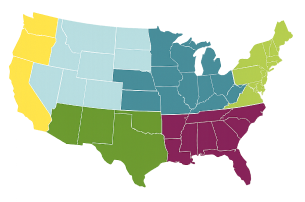
How do we use your location?
Knowing your location helps us recommend plants that will thrive in your climate, based on your Growing Zone.
The Story of the Spiderworts and John Tradescant. The Spiderworts common name is obvious; the blooms look somewhat like spiders. (Wort simply means plant or root in Latin.) But the botanical name is more interesting.
These flowers are named Tradescantia after two very interesting Englishmen, a father and son, of the Elizabethan Age. John Tradescant, the Elder was a royal gardener and became very famous for his travels and exotic plants he brought home from the Continent. His son traveled much further. Even though he died in 1662, only 42 years after the Pilgrims arrived, he managed three different trips to Virginia. He introduced the North American Tulip Tree and other plants to Europe, but he and his father are immortalized forever in these beautiful American wildflowers. There are several wild species of Tradescantias in eastern America, with flowers ranging from blue to pink to white. All have the distinctive three-petaled form, and all are plants of wet places. Most hybrids today are created from crossing T. virginiana, the common blue Spiderwort, with other species in the group.
As soon as your order is placed you will receive a confirmation email. You will receive a second email the day your order ships telling you how it has been sent. Some perennials are shipped as potted plants, some as perennial roots packed in peat. The ‘Plant Information’ section describes how that item will ship. All perennials and fall-planted bulbs are packaged to withstand shipping and are fully-guaranteed. Please open upon receipt and follow the instructions included.
Perennials and fall-planted bulbs are shipped at the proper planting time for your Growing Zone. Perennial and fall-planted bulb orders will arrive separately from seeds. If your order requires more than one shipment and all items are shipping to the same address, there is no additional shipping charge. See our shipping information page for approximate ship dates and more detailed information. If you have any questions, please call Customer Service at (802) 227-7200 or contact us by email or chat.